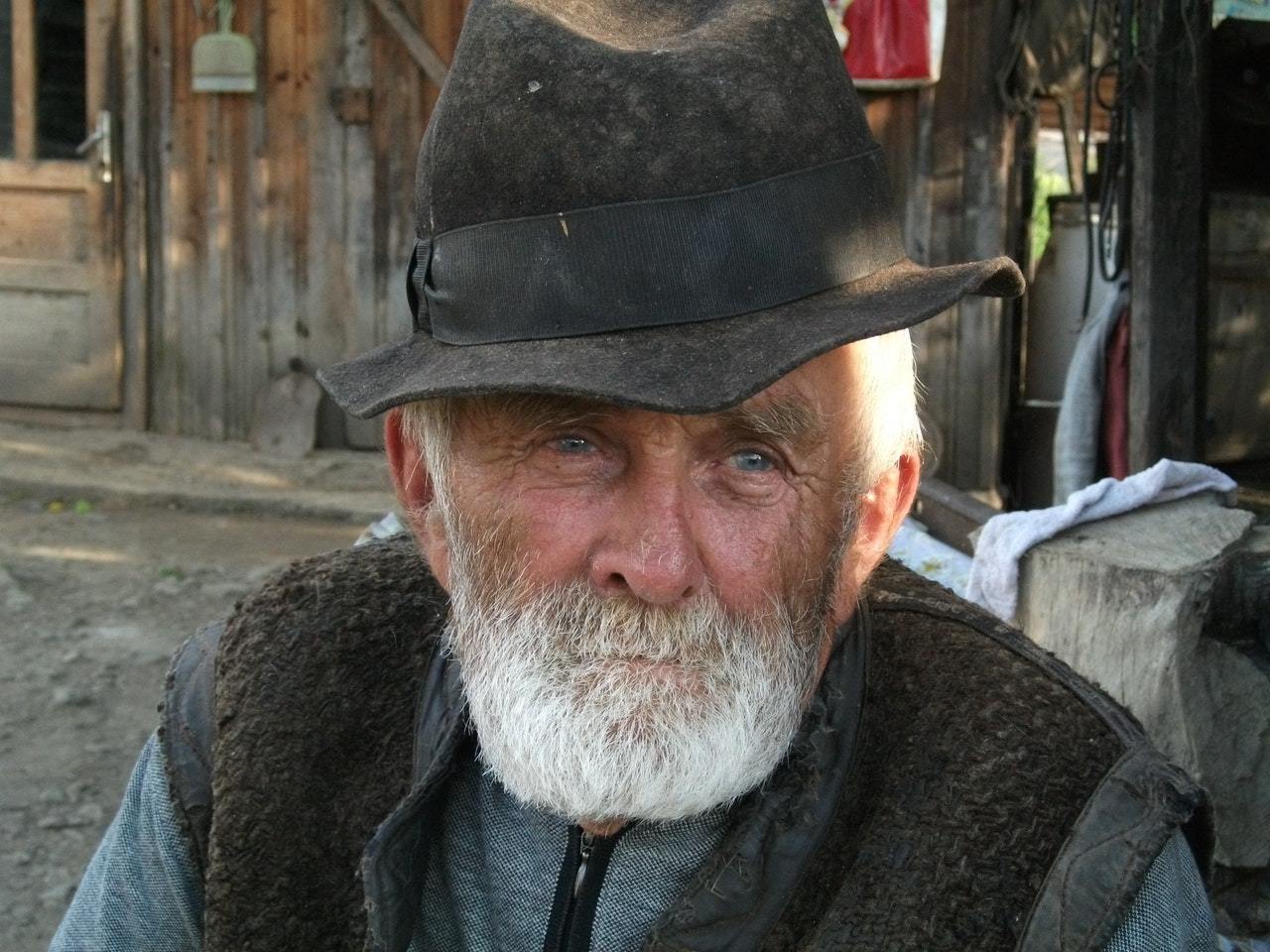He came from the highway. At least that’s what he’d said. A raggedy old man wearing dirty, torn clothes, appearing seemingly out of nowhere. The polished oak of his walking stick gleamed at us in the fading sunlight.
Mother and Freida had been chatting. I had been petting Poppy, Freida’s fluffy white poodle. The old man was suddenly with us, strolling up the sloping driveway with a deliberate and confident air. He smiled knowingly as he approached, as if he had somehow overheard the small-town gossip my mother and her longtime neighbor were sharing. Poppy was anxious to sniff this strange apparition, but Freida held her back.
Judging from his behavior, it appeared he was there intentionally to see my mother. Perhaps, through the powers of observation that come with age, he had correctly assumed her to be the lady of the house, someone who might be willing to dish out a small amount of kindness to a downtrodden soul. Yet he approached her with a determination that made me move closer, desiring protection for myself as much as for her.
Mother greeted him politely, smiling as she did so. He tipped his 1940s-style black hat in a courteous, overly formal gesture. His heavy, once-fancy suit seemed awkwardly out of place for the middle of spring and eerily out of fashion for the early 1960s.
His speech was eloquent. He touched Mother’s heart with his beautiful words, just as if he knew precisely how to reach her, knowing she was a lover of language, a teacher of literature.
He required sustenance, he explained, having not tasted a single morsel of food in several days. He’d had an unfortunate altercation with a member of his family and had departed in anger, traveling mostly on foot all the way from his lovely home somewhere north.
He didn’t really know where he was going. He was a drifter, he said. A transient traveler on life’s highway, ripped from the loving arms of his family by cruelty and hardship. Stripped of dignity, merely surviving in a state not unlike the world of dreams. Nightmares actually. It was a story woven of tragedy and loneliness, yet in telling it he revealed no trace of bitterness or despair.
Through my eleven-year-old eyes, it appeared that this man was not a stranger to my mother. She studied his face as he spoke, as if he were someone she hadn’t seen in many years. Someone she had known once but whose name had long since left her. She wasn’t hesitant, like Freida and I were, standing back, unsure and a little suspicious. Mother said yes, of course she would give him some food.
I followed her inside to the kitchen, leaving Freida and Poppy to watch over our uninvited driveway guest. I stood in shock as Mother slid our dinner out of the oven where it had been placed to stay warm until my father arrived home.
She spooned out large helpings of the meatballs and gravy she had prepared with roasted potatoes and sliced carrots into aluminum pie plates, covering each with another pie plate and taping them shut. She stuffed a half-dozen buttered rolls into a small paper bag, filled two large thermoses with sweetened iced tea, and wrapped half an apple pie in foil. She then carefully placed the dinner, complete with plastic eating utensils and the expensive paper napkins we used only when company came, in a large grocery sack and fashioned a carrying handle for it out of string and more tape.
“Why are you doing this?” I looked at my mother in disbelief. “How could you give some dirty stranger almost all our supper?”
My mother’s expression of disbelief was even stronger than mine as she glared at me.
“He’s hungry,” she said. “He’s an old man who’s separated from his family, and he needs help. Don’t worry,” she added, obviously disappointed in me, “you won’t miss a meal.”
“But he just showed up out of nowhere and he talks funny and how can you believe his story anyway?”
Mother didn’t answer. I followed her back outside.
He addressed my mother as “My Dear Lady.” He said God would reward her. He was genuinely grateful, almost tearfully so. He said something about the “family of man,” which I didn’t fully understand. Mother nodded her head.
“Will you be all right?” Mother wanted to know.
“Don’t worry,” he assured her. “Guardian angels are everywhere.” He smiled and winked as he said this.
We stared after him as he edged his way back toward the modern passageway from which he’d come, with his walking stick prodding the sandy earth beneath his feet. Well within our view, cars and trucks zipped north and south on the interstate, travelers oblivious to the odd encounter that had just taken place.
At first it was merely a faint whine, somewhere in the distance, unattached to us. Mother and Freida shared observations of the drifter, ignoring the warning. Freida said Mother was a saint to have given him the dinner she’d cooked.
The whine quickly became a piercing, disturbing wail that penetrated our peaceful evening and made us look once again to the highway. An ambulance flew past the other travelers, its speed and flashing lights signaling a crisis ahead. The drifter had vanished.
Freida said she and Poppy must go home. She had to throw some dinner together for Ned, her husband. We said our goodbyes, and Mother and I retreated into the safety of our home.
“Did you know that old man?”
Once again my mother stopped to stare at me in disbelief. “Don’t be ridiculous,” she said. “How in the world could I possibly know him?”
We ate dinner that night at the August Moon Café. Mother, of course, told Daddy about the drifter, but from her perspective, not mine. She said he was hungry and that she had given him some food. He came up to us because we just happened to be standing in the driveway. Easier to approach people who are already outside than to ring a doorbell and risk a slammed door in your face. It was a pragmatic, detached appraisal of what had taken place.
My father said “Hmm” a few times and continued with his dinner. The story was filed away, forgotten.
Johnny Carson was finishing his monologue when Freida called. I was sitting cross-legged on my parents’ bed with Mother grading school papers next to me and Daddy in the bathroom. Ned had been in an accident. A serious accident. The siren we heard, just after the drifter had departed, was meant for him.
Ned never regained consciousness. He lay for years in a coma, unable to communicate, drifting through time. Tragedy had ripped him from the loving arms of his family and transported him into a dreamlike state. A nightmare actually.
I did not bring up the possible connection between the drifter’s premonition-like appearance and Ned’s accident, fearful that my no-nonsense mother would think I’d lost my mind.
A few years later, at the wedding of Ned and Frieda’s daughter, the faint whine of a siren somewhere in the distance permeated the quiet sanctuary just as the bride reached the altar and the wedding march had ended. The minister paused as the whine grew to a piercing, disturbing wail. An ambulance raced past the church on its mission to rescue yet another traveler.
Stunned silence followed, broken only by the soft sobbing of those deeply moved by the all-too-obvious symbolism. I looked to my mother for reaction. Her eyes were empty of tears but unmistakably as wide and full of conjecture as mine. We were thinking of the drifter… and of Ned. She put her arm around my shoulders and drew me close, desiring protection for herself as much as for me.
Decades later I finally understood. What I had perceived to be recognition on the part of my mother for the old man who appeared in our driveway that Sunday evening was, in fact, something much more powerful—acceptance and understanding. And acknowledgment that we are all members of the family of man. She knew the three of us chattering away on a pleasant spring evening were not anointed ones who are separate and protected or immune to pain and tragedy.
She knew that we are all travelers. And often we are drifters, moving aimlessly about with no clear path ahead. Learning to accept what we can. Searching for reasons, for meaning. Adjusting and adapting. Holding on to hope. And bumping into guardian angels where we least expect to find them.
.



3 thoughts on “The Drifter”
So beautifully written Chris. I truly felt like I was on that driveway on a spring afternoon, watching one of the members of the family of man, I believe that it is our responsibility to help anyone in need of help, whether the need is large or small. Thank you for a beautiful read!
Judy A
Yes Chrissy I am sure you mother would have packed up your supper for Ned. Wonderful, thought provoking essay . I think you have a gift.
Such a beautiful well-written story.